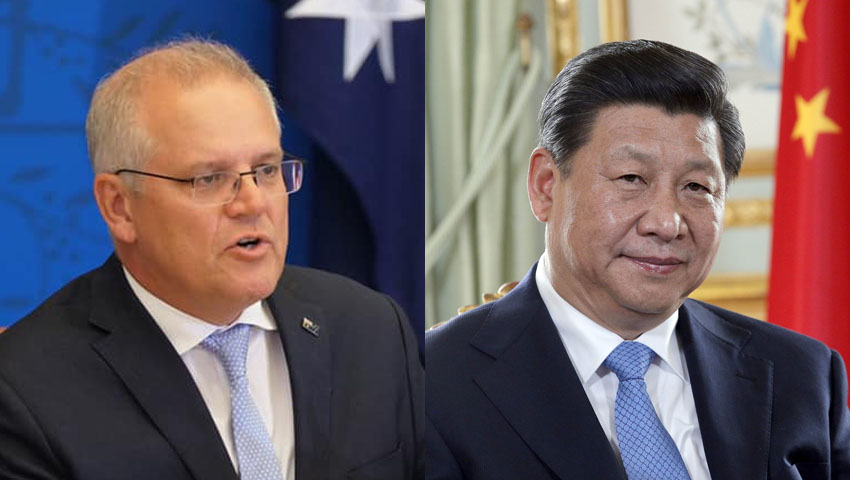Is there a path available for Canberra to mend ties with Beijing or has that ship sailed?
To continue reading the rest of this article, please log in.
Create free account to get unlimited news articles and more!
With the ongoing political and economic row between Australia and China showing no signs of tempering, many observers are calling on Canberra to extend an olive branch, fearing that a prolonged dispute could have an irreversible impact on the nation’s welfare.
Such observers claim that Australia has little choice in the matter, given its dependence on the Chinese market.
But according to Tom Switzer, executive director of the Centre for Independent Studies, reconciliation would only be possible if Canberra submits to the Chinese Communist Party’s (CCP) regional order.
“The truth is most great powers are ruthless beasts: they play hard ball at every turn; and the stronger China gets, the more it’s likely to throw its weight around,” he writes.
Switzer says China’s ambitions extend beyond eclipsing the US as the world’s leading superpower, arguing that the CCP has embraced “wolf warrior” diplomacy that seeks subservience from nations it does not control militarily.
“In the past, China has annexed territory in the old, conventional, imperial sense – think of Tibet, Xinjiang, Inner Mongolia. And that is certainly what it has in mind for Taiwan, the Diaoyu/Senkaku Islands and most of the South China Sea,” he says.
“But elsewhere, what it seeks is not territorial takeovers, but tributaries, in a new sense: the vision is that, thanks to China’s economic clout, other nations will consistently genuflect to it and not cross it.
“This vision has deep roots in China’s own history, summed up in two syllables – kowtow.”
Switzer questions whether it’s possible to rebuild trust with China without acquiescing to its demands.
“[How] do our leaders restore a dialogue with a hyper-nationalist China that wants us to kowtow? Doesn’t that represent a serious threat to our sovereignty? Doesn’t Beijing’s long list of demands as a prerequisite to improving relations make it harder for Canberra to do more to reboot relations with Beijing?”
Switzer stresses that appeasing Beijing would not dissuade the CP from “inflicting pain” on Australia by exploiting its trade dependence.
China, he adds, is mistakenly buoyed by a belief that it has a declining US on the ropes.
“[It] is true, the US is bitterly divided and frighteningly polarised whereas a hyper-nationalist China seems to grow more self-confident all the time,” Switzer writes.
“But the US also remains militarily and technologically the world’s most powerful nation. It is now energy independent whereas China is heavily reliant on foreign fossil fuels.
“US demographic trends are far more bullish than China’s. America’s leading universities remain the world’s best while the dollar remains the word’s reserve currency.”
Switzer claims that while wounded with division, both sides of US politics are aware of the need to curtail China’s bold rush for dominance.
“The evidence is clear that, with its withdrawal from Afghanistan, the US is more focused on Asia and intent on co-ordinating the efforts of allies to push back against Beijing’s bullying,” he writes.
“Joe Biden, like his predecessor, supports tougher anti-China measures, including a trade- and a high-tech war, the development of closer relations with Taiwan and the repudiation of Beijing’s claim that most of the South China Sea is its maritime territory.”
Switzer also notes support for an aggressive China policy among the US public, with a recent Pew Research Institute poll revealing that approximately 90 per cent of American adults view China’s power and influence as a threat — 62 per cent of which believe it is a major threat.
Like Americans, Australians are increasingly wary of China, further reducing the likelihood of a change of tone from Canberra.
Findings from the Lowy Institute’s Poll 2021 revealed that trust in China has slumped to a record low, with just 16 per cent of respondents stating they trust China ‘a great deal’ or ‘somewhat’ to act responsibly on the world stage, down from 52 per cent three years prior.
Just 10 per cent of respondents said they have ‘some’ or ‘a lot’ of confidence in China’s President, Xi Jinping, to ‘do the right thing’ regarding world affairs.
Confidence in the CCP’s chief has more than halved from 22 per cent in 2020, and is down a staggering 33 percentage points from 2018.
With the Biden administration committing to working with regional partners to form a coalition against the Chinese threat, Australia is likely to play a key role in countering CCP aggression across the Indo-Pacific.
Get involved with the discussion and let us know your thoughts on Australia's future role and position in the Indo-Pacific region and what you would like to see from Australia's political leaders in terms of partisan and bipartisan agenda setting in the comments section below, or get in touch with

 Login
Login







